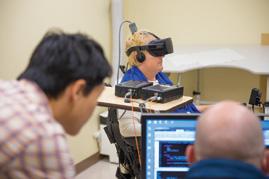
4 minute read
Hospital Price Transparency Requirements Set to Take Effect in January
Jonathan Gold, JD, AMRPA Director of Government Relations and Regulatory Affairs
In 2019, the Centers for Medicare and Medicaid Services (CMS) finalized regulations requiring all hospitals, including inpatient rehabilitation facilities (IRFs), to begin publicly disclosing a wide array of price information. All of these requirements go into effect January 1, 2021, and include two major requirements: 1) the posting of machinereadable files containing all third-party negotiated rates, and 2) a consumer-friendly website for common “shoppable services.”
In its final regulations, CMS defined hospitals subject to the new rule as those other than federally owned facilities, such as Veterans Affairs (VA) hospitals. In the notice-andcomment discussion, CMS affirmed that specialty hospitals such as IRFs were included in the definition of applicable hospitals. The agency also stated that each hospital that operates under its own separate license must separately comply with the requirements.
Under the first major requirement of the rule, hospitals must post a machine-readable file that includes standard charge information for all items and services they provide. This includes service packages or bundled rates for an episode of care. The standard charge information must include the following for all items and services:
• Gross charges, as reflected on the hospital’s charge master • Discount cash prices offered to self-pay patients • Payer-specific negotiated charges for all third-party payers • De-identified minimum and maximum negotiated charges This information must be updated at least once annually to meet the CMS requirements.
Under the second major provision of the new rule, hospitals must post the same standard charge information for at least 300 “shoppable services,” in a consumer- friendly format on its website. Services designated as shoppable must be available for scheduling in advance by the consumer. CMS has designated 70-specific services that must be included, and allows hospitals to choose the additional 270 services to include. If a hospital does not offer 300 total shoppable services, it must post as many items and services as are available. CMS is also permitting hospitals to create a cost-estimator tool on websites in lieu of a list of 300 shoppable services. This information must also be updated at least once annually.
CMS has also granted itself enforcement authority under this regulation. CMS stated that it plans to audit hospital websites, and investigate complaints submitted from the
public. If CMS determines that a hospital is out of compliance and a material violation exists, it will issue a written warning and request a corrective action plan. Following these initial actions, the agency will issue civil monetary penalties of up to $300 per day for continued non-compliance.
In addition to pushing back on these new requirements and their application to IRFs, AMRPA held informational calls to provide information on the new rules to member hospitals. There are also several recently enacted price transparency regulations that are similar, but that do not apply to IRFs. These include the requirement for acute-care hospitals to disclose negotiated rates on Medicare cost reports, and a requirement for insurers to disclose negotiated rates effective in 2022.
If you or your hospital has questions about these new regulations, contact the AMRPA policy team for assistance. AMRPA has also posted helpful resources on the Price Transparency requirements on its website, within the Policy Resources section.
RESTORING INDEPENDENCE.
RESTORING LIVES.
For nearly 50 years, JFK Johnson Rehabilitation Institute has provided expert rehabilitation care. We assist both adults and children living with disabilities in an effort to help them regain optimal function and independence.
Located in Edison, New Jersey, JFK Johnson Rehabilitation Institute has developed programs in specialties such as brain injury, stroke rehabilitation, orthopedics, musculoskeletal/sports injuries, cardiac rehabilitation, women’s health and pediatrics. Subspecialty services include spasticity, Parkinson’s, pain management, audiology, prosthetics and orthotics, cognitive and vocational rehabilitation, fitness and wellness.

Every challenge. Every achievement. Every success story. JFK Johnson Rehabilitation Institute is advancing what’s possible.
Visit JFKJohnson.org or call 732-321-7050 for more information.


The Science of Exceptional Care



As an innovator in rehabilitative care for more than 80 years, Casa Colina Hospital and Centers for Healthcare is committed to forward-thinking research that leads to improved outcomes for patients recovering from stroke, spinal cord injury, brain injury, and other disabling conditions. Since 1999, the Casa Colina Research Institute (CCRI) has conducted groundbreaking science to enhance care and discover new therapeutic interventions for these individuals.
Research at Casa Colina is a collaboration of scientists, doctors, and other medical and rehabilitation professionals. CCRI collaborates frequently with renowned institutions like Harvard University, Princeton University, Caltech, UCLA, and USC.
Our studies are generously funded through the support of the Casa Colina Foundation and other foundations and rehabilitation industry sponsors, including National Institutes of Health, Kenneth T. and Eileen L. Norris Foundation, UniHealth Foundation, and Ability Central.

For more information about CCRI, including research collaboration opportunities, please contact Emily Rosario, PhD, Director of Casa Colina Research Institute, at 909/596-7733, ext. 3036 or erosario@casacolina.org.










